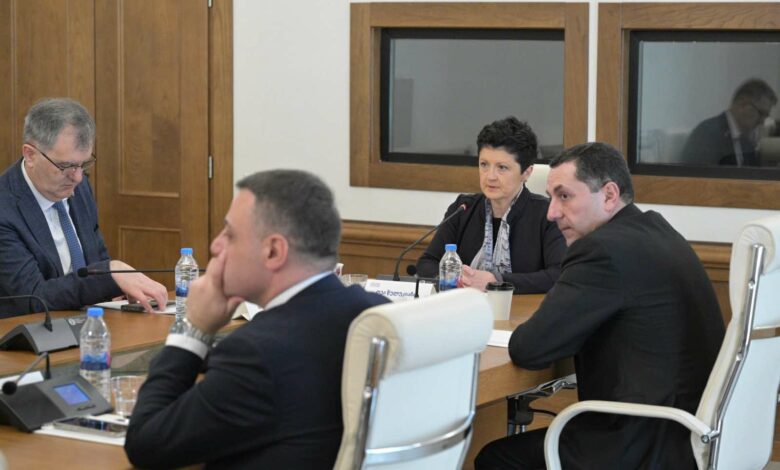
GYLA: Rejection to Appear Before GD Commission Cannot Be Qualified as Criminal Offense
The Georgian Young Lawyers’ Association (GYLA) has slammed the criminal charges against opposition figures for not appearing before the GD parliament’s commission investigating alleged crimes of the United National movement. The GYLA questioned the legitimacy and conduct of the commission, raising legal and constitutional concerns about its formation, composition, and activities. These relate to the recent criminal prosecutions against several opposition figures and the pretrial detention of former Defense Minister Irakli Okruashvili. GYLA argues that criminal prosecution for failing to appear before the commission is inconsistent with Georgian law.
GYLA Questions Legitimacy of the Commission
The organization noted that “the commission’s work is “problematic” especially in a context where the “legitimacy of the entire legislative body is itself under question.” It warned that the commission aims to marginalize opposition political parties, preparing the legal and political basis for their potential banning – an intention that GD officials and GD founder Bidzina Ivanishvili have publicly expressed.
The watchdog pointed out that the commission’s explanatory note lacks the requirements regulated by Parliament’s rules of procedure. The note did not specify sufficient information regarding which specific issues needed investigation, who would be summoned, and what documents would be reviewed during the sessions.
GYLA also points out that the commission is composed entirely of the GD parliamentary majority and includes quasi-opposition members who entered the rump parliament on GD’s electoral list. It argued this makes their participation merely “symbolic” and undermines the commission’s credibility.
Failure to Appear Before Commission and Legal Fallout
GYLA also criticized the commission’s decision to refer cases of non-compliance to the Prosecutor’s Office after several opposition leaders refused to attend. The group maintains that these refusals should not result in criminal charges.
While Georgian legislation includes both administrative (1773 Article) and criminal (349 Article) charges for failing to comply with investigative commission requests, GYLA insists that, in cases of legal ambiguity, the norm that least restricts personal freedom should be applied (in dubio pro libertate).
GYLA argues that Article 349 of the Criminal Code, under which opposition leaders are now charged, falls under the category of less serious crimes, which indicates that the act does not constitute a threat to public safety – something that would justify the extended application of criminal law against the person who committed it.
The watchdog argued that these charges fundamentally question the commission’s legitimacy, “especially considering that for months the Prosecutor’s Office has ignored genuine public interest and has failed to initiate criminal proceedings against those involved in organized acts of torture [ostensibly referring to the police’s brutal dispersals of the anti-regime protesters].”
Replacement of Bail with Pre-Trial Detention: Political Motives
GYLA criticized Tbilisi City Court’s May 14 decision to replace Irakli Okruashvili’s bail with pre-trial detention. Okruashvili, a former Defense Minister under the United National Movement government and now an opposition figure, is among those charged under Article 349 for failing to appear before the commission.
GYLA emphasized that Okruashvili had appeared at previous hearings and fully cooperated with court procedures. Nevertheless, the prosecution moved to replace the existing bail of 20,000 GEL with detention. While prosecutors are formally permitted to request stricter measures, GYLA underscored that such decisions must be guided by necessity and proportionality.
“In the present case, the prosecutor’s rigid, formalistic approach, devoid of substantive reasoning, further demonstrates that the Prosecutor’s Office is acting out of a politically motivated interest in punishing the individual,” the organization noted.
Nika Melia, Nika Gvaramia, and Zurab Girchi Japaridze of the Coalition for Change; Mamuka Khazaradze and Badri Japaridze, leaders of the Strong Georgia coalition; and Unity–UNM members Givi Targamadze and Giorgi Vashadze. All have refused to appear before the commission, and some refused the bail, citing their rejection of the legitimacy of both the GD parliament and its investigative body.
The only opposition leader to testify before the commission was Giorgi Gakharia, a former prime minister under the GD (2019- 2021) and now head of the For Georgia party.
Also Read:
- 15/05/2025 – Salome Zurabishvili: GD Launched New Wave of Repression Against Politicians
- 28/04/2025 – New Member in GD Commission Investigating UNM
- 11/03/2025 – GD Amends Rules to Let Commission Investigating UNM Request Probe at Any Stage
- 14/02/2025 – Tea Tsulukiani to Chair Parliamentary Commission Investigating UNM Government
- 07/02/2025 – GD Parliament Staffs Commission to Investigate UNM, Threatens Criminal Liability for Refusal to Cooperate
This post is also available in: ქართული Русский